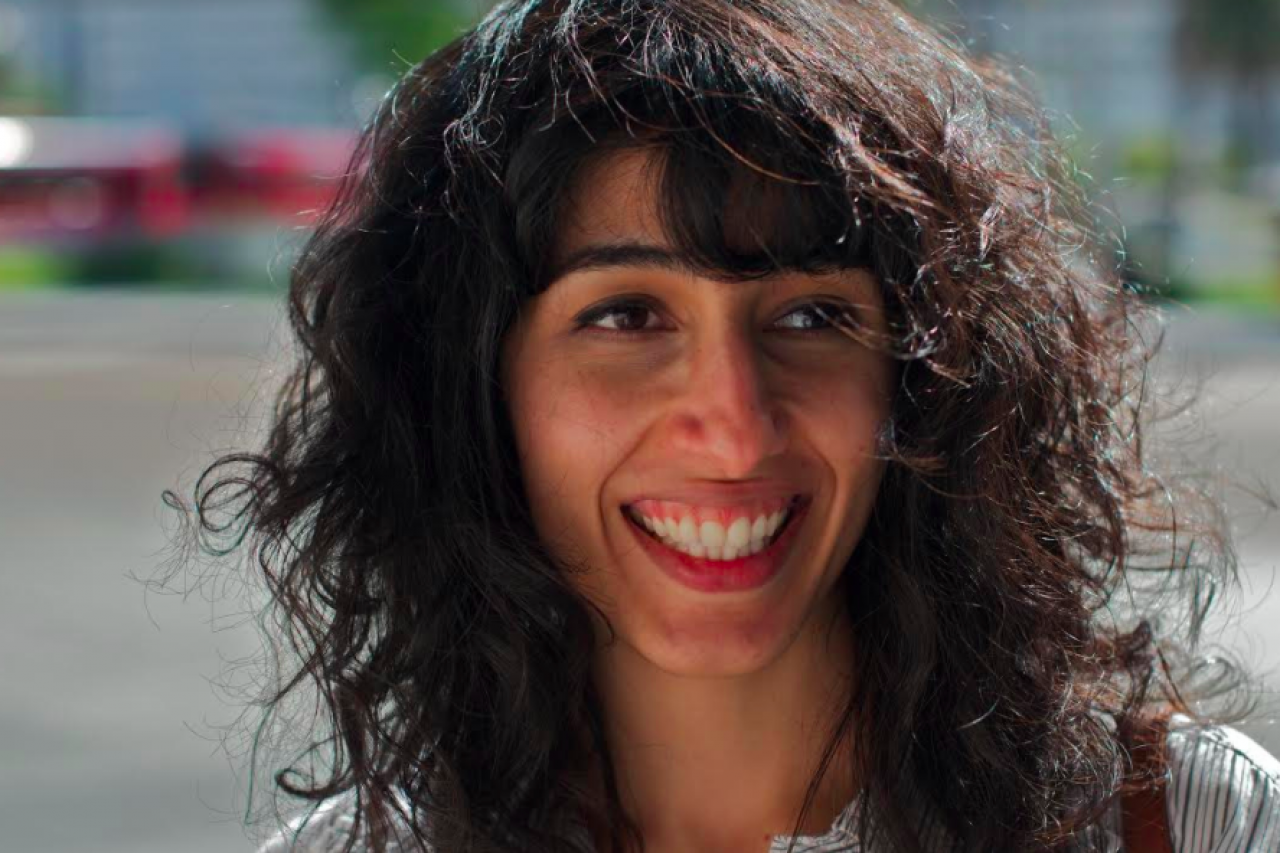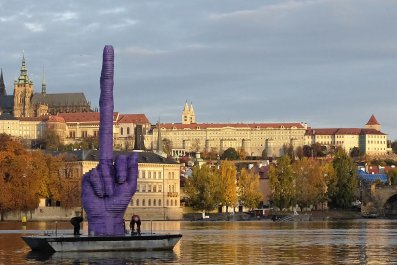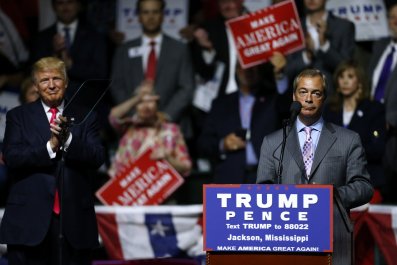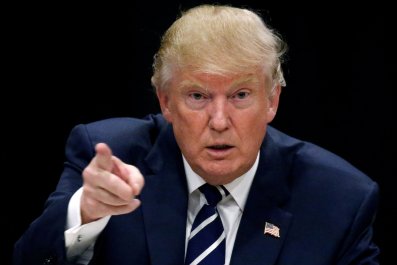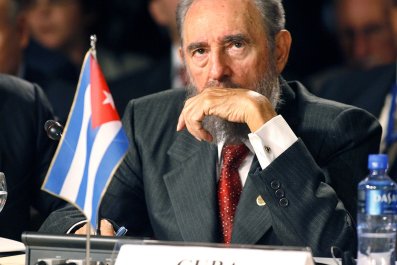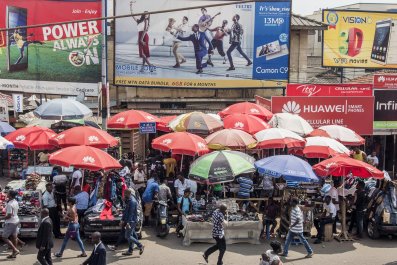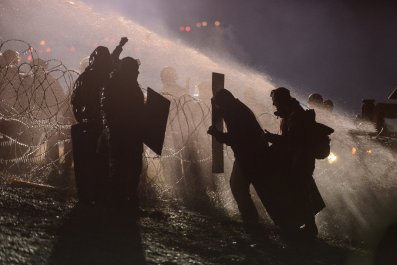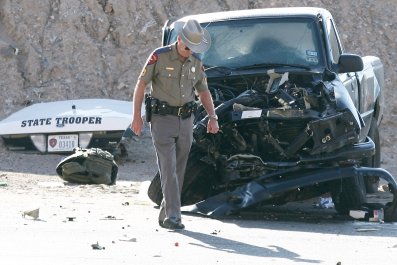One poem lists American military operations: Beastmaster, Hickory View, Riverwalk, etc. Another lingers with dark, dry humor on "WARHEAD MATING" and "HEIGHT HOLES." A third injects missile-technology lingo into the Book of Ecclesiastes: "For what is your life? It is even a THERMAL SHADOW."
The poet responsible for these verses is Solmaz Sharif, and when I meet her at a fashionable Oakland, California, café, she looks like one of its fashionable denizens, not someone who, by next week, could be the winner of the National Book Award for Look, her first book of poetry, which is political and confessional—and which relies heavily on terminology from the U.S. Department of Defense's Dictionary of Military and Associated Terms.
Not even the title of the volume is exempt from this intriguing confluence of the personal and the martial. Look is an invitation to the reader, but this most quotidian of words also describes, according to the military dictionary, "a period which a mine circuit is receptive of an influence."
For Emily Dickinson, life was "a Loaded Gun." For Sharif, it is a mine primed to blow. The title poem (which contains the Ecclesiastes reference) moves from a moment of intimacy, to a Hellfire missile being fired on Iraq, to a kind of unease about the American project, as befitting a poet born in Turkey to Iranian parents who settled in Los Angeles. As far as poetry goes, this is closer to Apocalypse Now than John Ashbery.
Which is how Sharif wants it. The job of a poet, she says, is to be "a bane to the republic. Because the republic is built on a destruction of language. A kind of obliteration of language that will enable and excuse violence against bodies. My job is to interrogate and agitate that as often as I can."
Moving between the personal and political, her poetry is always in a state of tumult—a state of war. Every one of the words from Dictionary of Military and Associated Terms are rendered, as above, in all caps. The effect is a muraled wall riddled by gunfire, photographed and turned into art. Sharif tells me that she wanted the military terms to act as "these little disruptive markers of violence" that would remind readers that war is a constant presence in our lives, as much here as it is over there.
She points to the varnished table where we sat, to her crumbled scone and my avocado toast. War was happening here too, she says. Only we need the courage to see it. Perhaps because of her ethnicity, or her convictions, Sharif sees it everywhere:
My father is not afraid of
SEDITION. He can
SEIZE a wild pigeon off a Santa Monica street or watch
SEIZURES unfold in his sister's bedroom — the FBI storming through.
Although the first-person voice throughout Look is not always Sharif's, the poems do follow her family's journey. Some of the poems are about her uncle, who was killed in the Iran-Iraq War. Sharif never knew him, yet she evokes him with the kind of battle-worn sorrow that the ancient Greeks lavished on their war dead:
Just, DESTROYED.
DIED OF WOUNDS RECEIVED IN ACTION.
Yes, there was EARLY WARNING.
You said you were especially scared
of mortar rounds.
Sharif is a child of conflict, born in 1983 in Istanbul because her parents had fled Iran after the overthrow of the Shah in 1979. They then moved to the United States, her mother going to the University of Alabama, her father working odd jobs in the Northeast. She imagines his experience—the classic immigrant tale—in a poem that has her father "driving a cab in Poughkeepsie, lifting lumber in Rochester...my baba downing Bud Light by the Hudson." The image, like so many in Look, is precise and evocative, the poetic equivalent of a drone strike.
Sharif's parents eventually settled down in Los Angeles, where Sharif spent most of her childhood. She went to college at the University of California at Berkeley and graduate school at New York University. Back in Los Angeles, when she was helping a photographer friend with a project, she became enthralled with the military dictionary.
The early curiosity became a book that took Sharif eight years to write and publish. Recent Man Booker Prize winner Paul Beatty had his novel The Sellout rejected 18 times by publishers; Sharif estimates she got as many rejections for Look, maybe more. "And I want to send thank-you notes to all of them," she says, laughing. Her manuscript was finally acquired by Graywolf Press, the revered independent Minneapolis-based press that has published the essayists Leslie Jamison, Maggie Nelson and Eula Biss, as well as the poets Tracy K. Smith, who won the Pulitzer Prize in 2012, Elizabeth Alexander, who read at President Barack Obama's first inauguration, and Claudia Rankine, whose Citizen has been lauded for its take on intractable racial issues.
"Sharif disrupts our assumptions about what constitutes poetry—and simultaneously makes a poetry of protest and of lyric devastation," says Graywolf Executive Editor Jeff Shotts. "There is nothing like this work."
Critics have agreed, with The New York Times calling the book "excellent." Bookforum noted that "there's something automatically evocative about the bureaucratic language of war, in the particular mismatch between the casualness of some words, the technological specificity of others, and the death hiding behind them all." Tellingly, that review was written by a national security reporter for The Intercept, where Glenn Greenwald, who wrote about the Edward Snowden documents, is an editor.
To be on the National Book Award short list has been "bizarre" for Sharif, given how many rejections Look received along the way. Even more bizarre: "Trump might be president during the ceremony." We are fretting over the polls in North Carolina and New Hampshire when Sharif considers an aspect of the Trump presidency that I had not contemplated before: "Who's that inaugural poet going to be?"
We sit there, at a loss, wondering who might to do for Trump what Robert Frost did for John F. Kennedy in 1961, endowing his first moments as president with moral authority. Then, suddenly, the answer occurs to me. He is not a poet, exactly, but he does work in verse, whiskey bottle in hand: Kid Rock.



